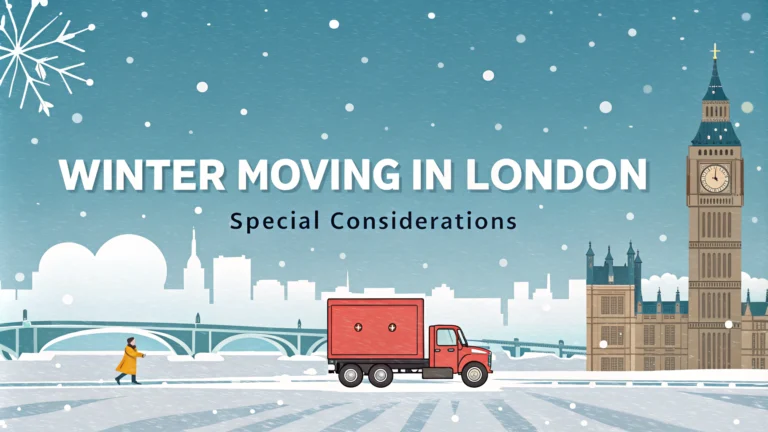London’s winter weather presents unique challenges when planning a move, with shorter daylight hours, frequent rain, and occasional snow affecting the logistics.
Moving companies typically charge less during winter months, making it a cost-effective time to relocate despite the weather conditions.
This guide covers essential winter moving considerations and practical solutions to ensure a smooth transition in London’s coldest season.
Weather-Related Planning
Book your move early in the day to maximize available daylight hours between November and February.
- Monitor weather forecasts for the week leading up to moving day
- Have a backup date arranged with your moving company
- Consider weather-proof covering for furniture and boxes
- Keep ice melt and snow shovels accessible
Protecting Your Belongings
Wrap electronics in bubble wrap and keep them at room temperature before transport to prevent condensation damage.
- Use plastic bins instead of cardboard boxes when possible
- Double-wrap valuable items with waterproof materials
- Place furniture legs in plastic bags to prevent water damage
- Use climate-controlled storage if needed between moves
Safety Measures
Clear pathways of ice and snow before movers arrive using salt or sand.
- Place old cardboard or mats at entryways to prevent slipping
- Ensure proper lighting for early morning or late afternoon moves
- Keep hot drinks available for movers
- Have first aid supplies easily accessible
Utility Considerations
Schedule utility connections at least two weeks in advance to ensure heating is working upon arrival.
| Utility | Notice Period | Priority Level |
|---|---|---|
| Heating | 2 weeks | High |
| Electricity | 1-2 weeks | High |
| Water | 1 week | High |
Recommended Moving Companies
Several London-based moving companies specialize in winter relocations with proper equipment and experienced staff.
- Aussie Man & Van: 020 7386 2244
- London Removals: 020 8877 9682
- Anthony Ward Thomas: 020 7038 0449
Cost-Saving Tips
Winter moves in London can be 20-30% cheaper than peak summer months.
- Book mid-week moves for additional discounts
- Compare quotes from multiple companies
- Ask about winter specials and promotions
- Consider sharing transport with another move
Making Your Winter Move Successful
Start early with preparations, keeping flexibility in your schedule for weather-related changes.
- Pack an essentials box with winter items
- Keep important documents in waterproof containers
- Take photos of valuable items before moving
- Have a backup plan for severe weather conditions
Insurance and Documentation
Verify your moving insurance coverage includes winter weather-related incidents and damage.
- Keep all moving documents in waterproof folders
- Take photographs of items before and after wrapping
- Document any existing damage before transport
- Confirm insurance terms with your moving company
Vehicle Preparation
Ensure moving vehicles have proper winter equipment and emergency supplies.
- Check tire conditions and pressure
- Keep de-icer and scrapers available
- Pack emergency breakdown supplies
- Verify heaters work in the cargo area
Communication Strategy
Maintain clear communication channels with all parties involved in the move.
- Share contact numbers with movers and neighbors
- Keep property managers informed of schedules
- Set up weather alerts on your phone
- Create a group chat for moving day coordination
Your New London Home Awaits
Winter moving in London requires extra preparation but offers significant cost benefits and flexibility in scheduling.
- Prepare both properties for winter conditions
- Follow weather updates closely
- Maintain positive communication with your moving team
- Embrace the advantages of off-peak moving season
Remember that successful winter moves in London depend on thorough planning, weather awareness, and working with experienced professionals who understand local conditions.
FAQs
- Is winter a good time to move in London?
Winter can be cost-effective for moving in London as it’s off-peak season, with lower rates from removal companies. However, you’ll need to consider shorter daylight hours and potential weather challenges. - What are the typical weather conditions for winter moving in London?
London winters typically experience temperatures between 2-10°C (36-50°F), with occasional frost, rain, and rare snowfall. The city averages 11 rainy days per month during winter. - How early should I start my winter move in London?
Start your move as early as 8AM to maximize daylight hours, as London experiences sunset as early as 4PM in winter. Complete major moving tasks before darkness sets in. - What precautions should I take when moving furniture in wet London weather?
Use waterproof covers for furniture, ensure proper grip on items, protect wooden floors from wet footprints, and use additional padding for delicate items that could be affected by moisture. - Are London removal companies available during the holiday season?
Most London removal companies operate during winter but have limited availability during Christmas and New Year. Book at least 4-6 weeks in advance for December-January moves. - What should I do about parking during a winter move in London?
Arrange parking suspensions at least 10 working days in advance through your local council. Consider extra space needed for removal vehicles in wet conditions. - How do London’s winter traffic conditions affect moving day?
Winter weather and holiday shopping can increase London traffic significantly. Plan for 20-30% longer journey times and check TfL updates for road works and conditions. - What additional costs should I consider for winter moving in London?
Budget for potential additional costs like temporary storage if weather delays occur, extra packaging materials for moisture protection, and possibly higher heating costs during the moving process. - How should I prepare utilities for a winter move in London?
Ensure heating and electricity are working in your new property before moving day. Schedule utility transfers accounting for peak winter usage and potential weather-related connection delays. - What are the advantages of moving during London’s winter months?
Winter moves often come with reduced rates, better availability of removal companies, less competition for moving slots, and potentially lower rental prices for new properties.







